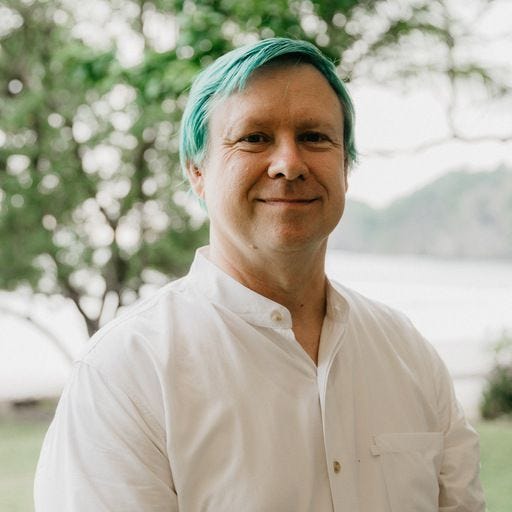Issue 25: Slim Moon of Kill Rock Stars
Welcome to The Band Bible! I’m truly glad to have you here. If you’re a new reader, purpose of this newsletter is to address, break down, and shine a light on the business of being in a band. Each issue, we do this by interviewing (and celebrating!) someone who is making waves through their incredible work with or for independent artists. Sometimes, we interview independent artists themselves. Learning the business of being in a band is something that is often inaccessible or shrouded in mystery, and it shouldn’t be, so I hope The Band Bible is able to play even a small role in helping to change that.
It’s a tremendous honor to share that this issue’s interviewee is the one and only Slim Moon, founder of the landmark label Kill Rock Stars. Kill Rock Stars, which was founded in 1991 in Olympia, Washington, was a driving force behind putting the city’s iconic music scene on the map. The label was behind early releases from the likes of Bikini Kill, Sleater-Kinney, Bratmobile, and so many more groundbreaking artists. By championing emerging talent from the jump, Kill Rock Stars made history. Movements, scenes, and careers alike wouldn’t have existed if the label didn’t.
I proudly count myself to be a part of this web of impact. I first became aware of Kill Rock Stars while in undergrad, long before Carnival of Oddities was even a germ of an idea in my mind, but the lesson I took away from learning its history was clear: magic happens when you take chances on people. Later, when I was developing the business, I brushed off anyone who questioned the sustainability of only working with emerging artists. I knew it was important work to undertake because Kill Rock Stars was already a shining example of how much goodness can bloom when effort is put into nurturing the talent pipeline. As of this year, it has been so for thirty-three years, and the world is all the better for it.
That said, Moon — who has fostered the development of talent for decades — could not be more of a perfect fit to be interviewed in The Band Bible. Enjoy the interview.
What did your day-to-day look like in the early years of Kill Rock Stars?
This was the early 90s. There was a lot of talking on the phone. Talking to bands, talking to record pressing plants and printers, talking to the distribution company, talking to publicists, booking agents, etc.
Has your relationship to the music industry evolved over the course of your career? If so, how?
I was sort of an “angry young man.” 33 years later my values haven't changed but my appreciation of the complexities of the issues have deepened. There are inherent problems with large corporations, for instance, but I have grown to find out that nevertheless, there are many good people who work at some of those corporations.
Kill Rock Stars has become such a seminal label. Which element(s) of its impact are you most proud of?
I’m really proud of how many women artists and musicians were always involved, even back when that wasn’t as common. I’m really proud that we’ve released so many albums that were that artist’s first nationally/internationally distributed release - we’ve focused on launching careers rather than picking up “hot” bands who have lots of labels vying to put out their music. It involves risk and it isn’t the best way to get rich and famous but it is really fulfilling.
What makes an artist stand out to you?
This is such a hard question. I look for two things that are admittedly extremely suggestive.
1). Is the artist and/or their message “important.” It can be important because it is exploring new creative sonic ground, or important because of the social location and identity of the artist(s), or important because it means a lot to a lot of people, or important because it has a strong important “message,” or all of the above.
2). Does their current work hint at even greater things in the future. I am really interested in development, and I tend to work with artists who I think have their greatest work still ahead of them, and I’m always thinking of their future albums, not only the one they are currently working on or just delivered.
Lastly, which "commandment" would you like to leave behind in The Band Bible?
1). It’s not that hard to be a great band with a really basic guitar player. It’s not that hard to be a great band with an average keyboard player. It isn’t really necessary for a singer to have great range and control. But it is very hard to be a great band without a great drummer.
2). It’s really useful to be honest with yourself about why you do what you do. If the real reason you make music (or work in the music business) is because it is fun, don’t constantly tell yourself and others that your main goal is to have a career or to be famous - say “I do this because it is fun.” Being honest about that doesn't mean you can’t/won’t have a career in music, but it does probably help ensure that you keep having fun. On the other hand, if your main goal really is to get famous, being honest with yourself about that will probably help you feel some equanimity and acceptance about the compromises you are likely to have to make in order to get famous.
A huge thank you to Slim Moon for taking the time to share such fantastic answers. To keep up with Kill Rock Stars, click here to visit their website.





